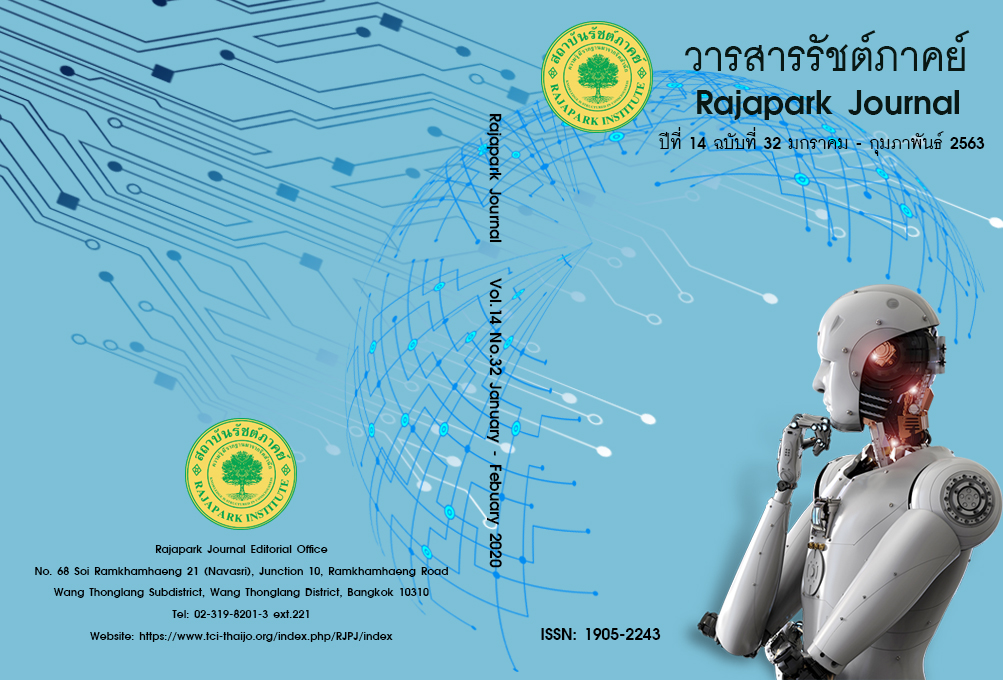Success Factors in Management: A case study of the Sufficiency Economy Learning Center, The Office of the Royal Development Project Board
Main Article Content
Abstract
This mixed-method research design aimed to study success factors in the management of the sufficiency economy learning center. The sample was a group of 192 people who have experience related to management and was selected by Taro Yamane formula. The instrument for collecting data were questionnaires and semi-structured interviews. The data analysis used was Descriptive Statistics, Inferential Statistics, and Content Analysis. The research revealed that 1) personal factors, i.e. gender, age, education levels, and occupation had a relationship with leadership, teamwork, social network establishment, the technology supporting learning, product management and marketing, and social and environmental responsibility but did not correlate with being a learning organization. 2) The sample did not give importance to teamwork in a tangible manner, and they did not understand being a learning organization, and no sufficient supporting budget was available for purchasing technological devices. 3) A small number of government agencies that support the operation of the learning center, causing the development of the learning center relied on its potential and did not have outstanding directions. So these results could be used to develop operational guidelines and a role model of learning center management in the future.
Article Details
Views and opinions appearing in the Journal it is the responsibility of the author of the article, and does not constitute the view and responsibility of the editorial team.
References
Eagly, A. H., & Carli, L. L. (2003). The female leadership advantage: An evaluation of the evidence. The
leadership quarterly, 14(6), 807-834.
Goldie, J. G. S. (2016). Connectivism: A knowledge learning theory for the digital age. Medical teacher, 38(10),
-1069.
Kanhachin, P. (2014). The Strategies Enhancing the Participatory Self-reliance at the Village Level Based on the
Sufficiency Economy Philosophy of Villages in Nongbualamphu Province. Journal of Language, Religion
and culture, 2(2), 63-78
Khamcharoen, S., & Sirisarnhiran, S. (2009). A Study of the Relationship Between Leadership Styles of
Administrators and Public Participation in the Administration and Operation of Salaya Subdistrict
Administration Organization. Quality of Life and Law, 5(1), 37-48.
Marquardt, M. J., & Reynolds, A. (1994). The Global Learning Organization. New York: IRWIN.
Naipinit, A., Promsaka, T., & Kroeksakul, P. (2014). Sufficiency economy for social and environmental sustainability: A case study of four villages in rural Thailand. Asian Social Science, 10(2), 102.
Naowawathong, P., & Supadit, T. (2008). Sufficiency Economy Community Management: A Case Study of Kham
Pla Lai Village, Ban Dong, Ubonrat, Khon Kaen. Good Environmental Management of National Institute
of Development Administration, 4(2), 38-49.
Noknoi, J. et al. (2011). Various vision on knowledge management and the creation of a learning organization.
Bangkok: Chulalongkorn University.
Panyacharoen, S. (2018). Management: Perspective from the past to the present and the future. Bangkok:
Chulalongkorn University.
Pongpit, S. (2003). Plan for Community Economic Life. Bangkok: Phumpanya Thai Press.
Research and Development Institute of Sufficiency Economy Philosophy Foundation. (2012). Follow the footsteps
of His Majesty the King's philosophy of sufficiency economy. Bangkok: Phet Rung Printing Center.
Saengduangdee, S., Buawech, Y., & Sujittavanich, M. (2014). Guidelines for the development of communication
roles and capacity of the community Learning Center on Philosophy of Sufficiency Economy in agricultural section as desired by Lamphaya community, Amphoe BangLen, Nakhon Pathom Province. Dhurakij Pundit Communication Arts Journal, 8(2), 53-117.
Sanguannam, C. (2002). Theory and practice in educational institution administration. Bangkok: Ruamsan.
Schermerhorn. J. R. (1999). Management. (5th ed.). USA: John Wiley and Sons, G-2.
Schumann, D., Peters, J., & Olsen, T. (2013). Cocreating value in teaching and learning centers. New directions
for teaching and learning, 2013(133), 21-32.
Sisaed, R. (2013). An evaluation of the Community sufficiency Economy Learning Center Program: A Case Study
of a Community Sufficiency Economy Learning Center in the East. Journal of Research Education
Srinakharinwirot University, 8(1), 152-161.
Sukapap, N. (2013). The Study on Developing Process of Learning Center for the Development of Sufficiency
Economy: A Case Study of Ban-Thon-Na-Lap, Bandung District, Udonthani Province. Paper presented at
the Kasetsart University, Kamphaeng Saen Conference Kasetsart University. (6-7 December 2013). Kamphaeng Saen, Nakorn Pathom.
The Office of the Royal Development Project Board. (2008). The 1st Sufficiency Economy Philosophy Contest.
(2nd Edition). Bangkok: Arun Printing.
The Office of the Royal Development Project Board. (2011). The 2nd Sufficiency Economy Philosophy Contest,
Bangkok: Arun Printing.
The Office of the Royal Development Project Board. (2013). Information for the meeting of the Working Group on
Standards Development of the BAAC Learning Center on June 19, 2013, at the Meeting Room 201,
Office of the Royal Development Projects Board.
The Office of the Royal Development Project Board. (2016). Report of Performance Indicator 1.4 percentage of
successful operating the Sufficiency Economy Learning Center in 9 months (October 1, 2015 –June 30, 2016).
The Office of the Royal Development Project Board. (2016). Summary Seminar Report of the Sufficiency
Economy Learning Center, Paper presented at Royal River Hotel, (August 9-10, 2016). Bangkok.
Thiamrat, D., & Makasiranon, K. (2003). Discipline for the Learning Organization (The Fifth Discipline). (4th ed.).
Bangkok: Express Net.
Vanichbancha, K. (2012). Using SPSS for Windows for data analysis. (20th ed.). Bangkok: Chulalongkorn
University Press.
Wadeecharoen, W. Lertnaisat, R., & Teekasap, S. (2017). Research methodology from theory to practice. Bangkok:
SE-EDUCATION.
Wipawin, N. (2015). Social network in a networked society. Thai Library Association, 8(2), 119-127.


